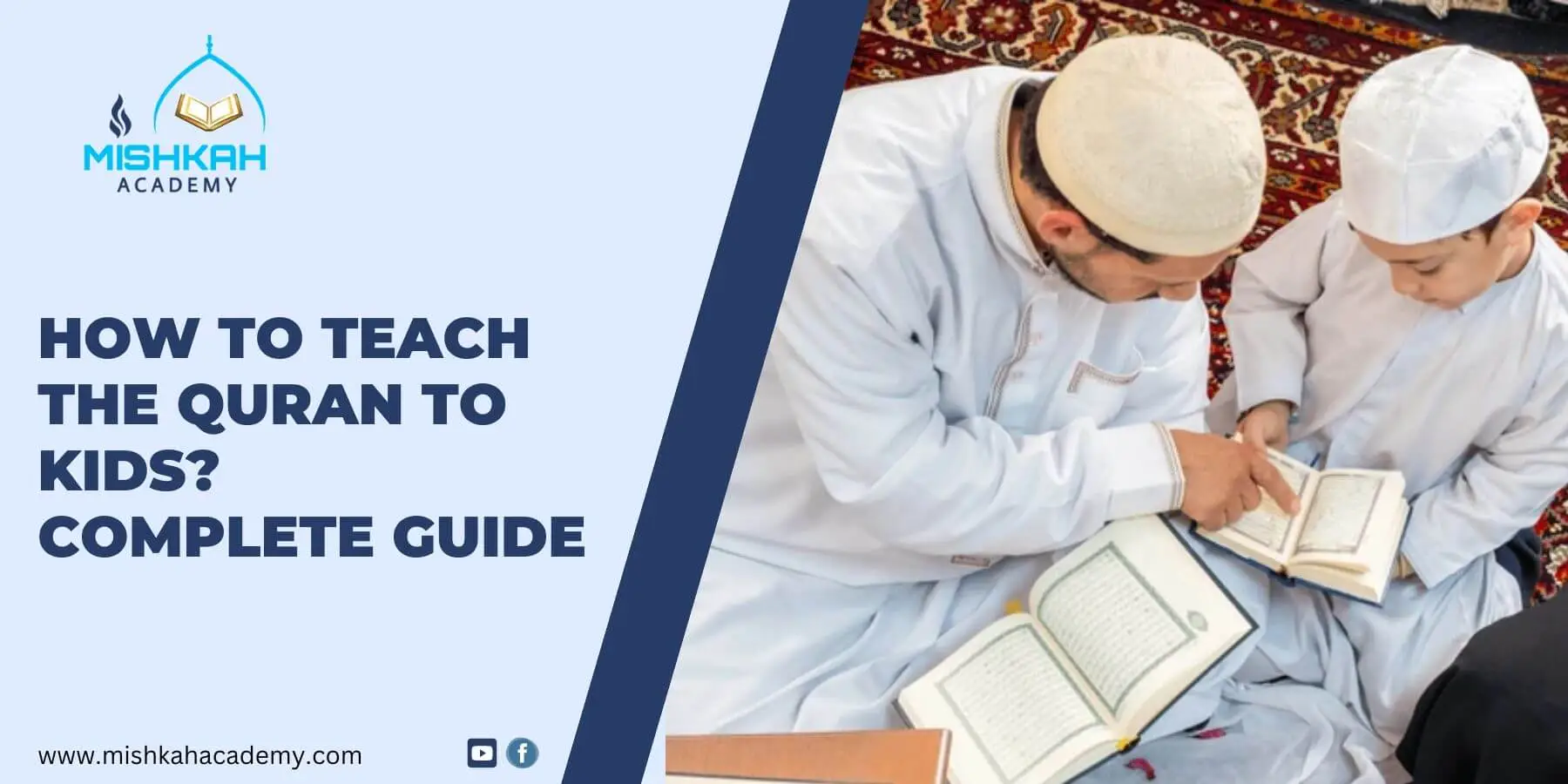Teaching the Quran to your kids is one of the most important aspects as parents. Early age is the right time for the kids to develop basic and strong fundamentals regarding the Quran so that they can follow the righteous path. However, parents often struggle to find the right ways to teach their kids the Quran.
The best way to begin is by developing the basics using the Noorani Qaida. Share famous stories of Prophets from the Quran, make them learn the basic duas from the Quran, set a daily Quran learning limit, read the Quran with them, and more. Let us guide you, all parents, in detail on how exactly to implement each one of these tips to teach the Quran to kids.
8 Practical Tips to Teach Your Kids the Quran
Table of Contents
ToggleHere are some tips shared by Mishkah Academy Quran tutors in quran classes for kids to teach Quran to kids.
1. Use the Noorani Qaida to Teach the Basic
Teaching your kids the Quran starts with understanding the letters, sounds, and rules of reading Arabic. Noorani Qaida is the best tool for this. It breaks everything down into simple steps that kids can easily follow. Here are four basics you can focus on:
- Arabic Letters: Teach them how each letter looks and sounds.
- Harakat: Show them how small marks change the way a letter sounds.
- Joining Letters: Explain how letters connect to form words.
- Rules of Pronunciation: Introduce simple Tajweed rules so they learn to recite quran beautifully.
2. Share Stories of Prophets from the Quran for Inspiration
Kids love stories, and the stories of the prophets in the Quran teach valuable lessons. Sharing these stories can inspire your child to love learning the Quran. Here’s a table of some prophets and their key stories:
| Prophet Name | Story from the Quran |
| Prophet Adam | The creation of Adam and his stay in Jannah (Surah Al-Baqarah, 2:30-39) |
| Prophet Nuh | Building the ark and the great flood (Surah Hud, 11:25-49) |
| Prophet Ibrahim | The test of faith with his son (Surah As-Saffat, 37:100-111) |
| Prophet Musa | Parting of the sea and leading his people (Surah Taha, 20:77-79) |
These stories show patience, obedience, and trust in Allah, motivating children to follow the teachings of the Quran.
3. Teach the Child with Patience and Tolerance
Teaching kids the Quran requires patience and tolerance. Children learn at different speeds, so it’s important to stay calm and supportive. From a psychological view, kids respond better when they don’t feel pressured. If they sense frustration, they might lose interest. Instead, celebrate their small achievements and correct mistakes kindly.
This positive reinforcement builds confidence, helping them feel good about learning. Additionally, enrolling them in an online Quran recitation course can provide structured and flexible learning opportunities that complement your efforts. Patience gives kids the space they need to absorb new information. Learning the Quran is a gradual process, so by staying tolerant and calm, you’re creating a loving and supportive learning environment.
4. Make Them Learn the Basic Duas from the Quran
Teaching your child basic duas from the Quran helps them connect to Allah in daily life. These short prayers are easy to memorize and useful for different situations. Here are some simple duas:
- اللَّهُمَّ أَدْخِلْ عَلَى أَهْلِ القُبُورِ السُّرُورَ
Oh Allah make the people of the graves happy - اللَّهُمَّ أَغْنِ كُلَّ فَقِيرٍ
Oh Allah help every poor person - اللَّهُمَّ أَشْبِعْ كُلَّ جَائِعٍ
Oh Allah feed every hungry one - اللَّهُمَّ اكْسُ كُلَّ عُرْيَانٍ
Oh Allah clothe every unclothed one - اللَّهُمَّ اقْضِ دَيْنَ كُلِّ مَدِينٍ
Oh Allah help everyone pay their debts - اللَّهُمَّ فَرِّجْ عَنْ كُلِّ مَكْرُوبٍ
Oh Allah help every sad one - اللَّهُمَّ رُدَّ كُلَّ غَرِيبٍ
Oh Allah return every traveler (to his home)
5. Set a Daily Learning Limit According to the Child’s Capacity
When teaching your child the Quran, it’s important not to overwhelm them. Setting a daily learning limit based on their capacity ensures they stay interested and don’t feel burdened. For example, you can start with something small, like learning a short dua or a small surah from Juz Amma, such as Surah Al-Fil or Surah Al-Ikhlas. This approach allows them to learn without pressure, building confidence and helping them read Quran fluently over time.
Setting small goals helps them feel accomplished, and as they progress, they’ll develop a strong connection with the Quran. Make sure to praise their efforts, as this encourages them to continue learning with a positive attitude and a happy heart.
6. Use Quranic Apps and Games for an Immersive Experience
Quranic apps and games make learning fun and interactive for kids. These apps engage children through colorful visuals, interactive lessons, and fun quizzes. Here are some popular ones:
- Muslim Kids TV: Offers Quranic stories, games, and activities.
- Noorani Qaida App: Helps teach the Arabic alphabet and basic reading rules.
- Quran Companion: Gamifies memorizing the Quran with rewards.
- Ayat–Al Quran: Allows children to read and listen to the Quran.
7. Try to Read the Quran with Them for Motivation
Reading the Quran together with your child can be a great source of motivation. When kids see you reading with them, they feel supported and inspired. It also becomes a special bonding time between you and your child, making learning enjoyable.
You can take turns reciting small parts, correct each other gently, and talk about the meanings. This habit not only motivates them but also teaches them the importance of regular Quran reading. Your involvement shows them that learning the Quran is a priority, and they will be encouraged to keep going.
8. Take a Quran Tutor’s Help for the Best Possible Guidance
A Quran tutor can give your child personalized attention, making sure they learn the right way. Quran tutors know how to break down difficult topics and can help with pronunciation and memorization. Here are some key benefits of hiring a tutor:
- Personalized lessons based on your child’s level.
- Proper Tajweed and pronunciation guidance.
- Helps set achievable learning goals.
- Provides a structured learning schedule.
- Offers encouragement and feedback regularly.
What is the Best Age to Teach the Quran to Kids?
The best age to start teaching kids the Quran is around 2 years old. At this age, they can begin by learning small duas for daily activities, such as eating or sleeping. These short prayers are easy to memorize and introduce them to the idea of remembering Allah in their daily lives.
By the time they turn 3 or 4, you can move on to teaching Arabic letters using the Noorani Qaida. This will help them recognize letters and sounds.
By 5-6 years old, you can start teaching short surahs from Juz Amma, like Surah Al-Fil and Surah Al-Ikhlas, and make them practice daily. Starting early makes Quran learning smooth and enjoyable.
Conclusion
Teaching your child the Quran from an early age sets a strong foundation for their spiritual growth. While memorizing on your own is good, having an expert Quranic tutor is essential for proper guidance in hifz classes for kids. Mishkah Academy is the best platform for this, offering experienced Quran tutors to ensure your child learns the Quran with the correct pronunciation and understanding. With their help, your child can effectively learn to read Quran online, benefiting from structured lessons and personalized attention.
Start Kids Quran Learning Journey Today





